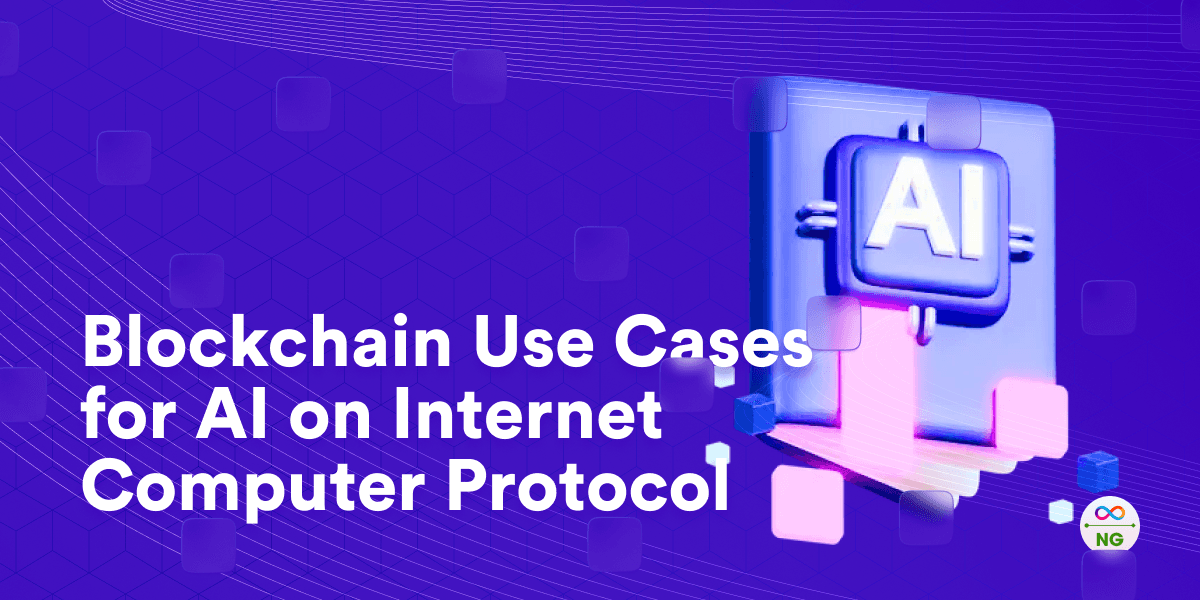
Deep learning, with its ability to sift through oceans of data and extract meaningful insights, is revolutionizing how we understand and interact with the world. Concurrently, blockchain technology is building a decentralized, secure infrastructure for digital transactions and data storage.
The convergence of these two powerful technologies, AI's analytical depth and blockchain's unyielding integrity, is creating intelligent, automated systems capable of making decisions with a level of reliability previously unattainable.
We're witnessing the birth of a new paradigm where data-driven insights translate directly into tangible, real-world outcomes.
The Internet Computer Protocol (ICP) is changing the game for AI inference, thanks to its decentralized, scalable, and cost-effective environment. In this article, we'll showcase five real-world applications that illustrate how ICP's decentralized architecture is set to revolutionize entire industries.
AI for Decentralized Finance (DeFi)
DeFi applications require sophisticated AI models for risk assessment, fraud detection, and automated trading. On ICP, AI-powered smart contracts can execute predictive analytics without needing an off-chain component.
Use cases include:
- AI-powered credit scoring: Imagine a lending dApp that evaluates a user’s creditworthiness based on on-chain and off-chain data, providing fair and transparent loan assessments.
- Algorithmic trading: AI-driven bots could analyse market trends and execute trades directly on-chain, optimising strategies for decentralized exchanges.
- Dynamic interest rates: Instead of fixed rates, lending platforms could use AI to adjust interest rates in real-time based on market conditions, user risk profiles, and liquidity demands.
With ICP’s seamless integration with Bitcoin and Ethereum, these AI-powered DeFi applications can operate across multiple blockchains without centralized intermediaries.
AI for Deepfake Detection & Content Verification
With the rise of deepfake technology, misinformation is becoming a significant global issue. AI models can detect manipulated content, but for such a system to be trustworthy, it must be transparent and decentralized.
Using ICP, an AI-powered content verification system can be deployed on-chain, ensuring:
- Immutable verification: AI models analyse videos, images, and audio, storing verification results transparently on the blockchain.
- Censorship resistance: No single entity controls the system, preventing manipulation or biased content filtering.
- Open-source trust: Users can verify the AI model’s logic, ensuring accountability in how fake content is detected.
By building this on ICP, content verification can become a global public good, combating misinformation in a provably fair and open manner.
AI-Powered Decentralized Gaming
Decentralized gaming has taken off with blockchain-based assets, but most of these games still lack intelligence. With AI integration, you could build a game where in-game characters learn, adapt, and interact in a human-like way.
For example, a CryptoKitties-style game on ICP could have AI-powered pets that evolve based on user interaction. Instead of static collectibles, these digital creatures would have personalities, emotions, and learning capabilities. AI-generated NPCs could also make gameplay more dynamic, creating a truly immersive Web3 gaming experience.
ICP’s decentralized architecture ensures that AI-driven game logic is transparent, fair, and tamper-proof, players can trust the system without fearing centralized control.
A P2P AI Marketplace on ICP
Imagine an eBay-style decentralized marketplace where AI developers can monetise their models without intermediaries. You, as an AI developer, could upload a trained AI model, such as a facial recognition system, onto the blockchain. Users who need AI services can call your model through an API and automatically pay you in cryptocurrency based on usage.
With ICP’s smart contracts (canisters), this marketplace can be fully decentralized, ensuring transparency, fair pricing, and permissionless access. Developers have the incentive to publish high-quality models, and users benefit from a wide range of AI services without relying on centralized cloud providers.
AI-Powered Smart Contracts (On-Chain AI Inference)
Most blockchains today don’t have built-in AI, which makes decentralized apps (dApps) less smart. For example, imagine a decentralized Spotify that can’t suggest songs or a decentralized Uber with no AI to set fair prices, they wouldn’t work as well as their centralized versions.
Why? Traditional blockchains use slow, expensive CPU-based virtual machines, making AI-powered tasks difficult to run.
How ICP fixes this:
- It allows smart contracts to run WebAssembly, a more efficient way to process data.
- It integrates with Chain Fusion Technology, making AI processing smoother and faster.
This means developers can now build AI-powered dApps that understand user requests, generate smart responses and make on-chain decisions efficiently. In short, ICP makes it possible to run AI directly on the blockchain, fast, affordable, and scalable.
Potential use cases include:
- AI-driven chatbots that provide real-time support in DeFi applications.
- Personalized content recommendations for decentralized social platforms.
- AI-based fraud detection systems for blockchain transactions.
AI-powered decentralized applications (dApps) on the Internet Computer Protocol (ICP) are moving from theory to reality. ICP's infrastructure makes it ideal for building intelligent, autonomous dApps across various sectors. The message is a call to action: the AI revolution is happening, and ICP offers a prime platform for developers and entrepreneurs to build the future of decentralized AI.
Article By: Mana Lamja